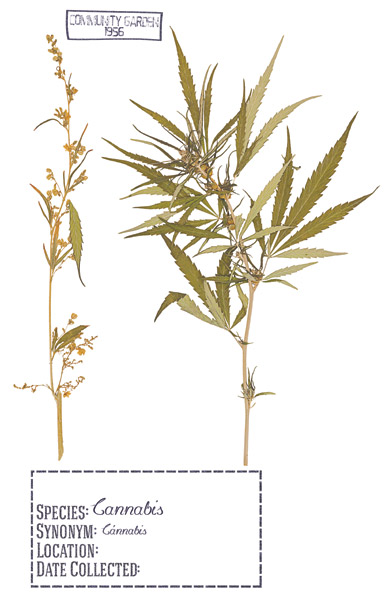
By Jonathan Evans
Herbal Information Specialist/
Business Representative for the Herbarium
There is more to cannabis – defined as both hemp and marijuana by Merriam –Webster – than getting high. I’m guessing many readers had first-hand experience with marijuana in their early days, or at least saw the film, “Reefer Madness.”
The story of cannabis is interesting and threads its way through America’s history. Our founding fathers grew hemp. Many early settlers were required to produce it for merry old England, and hemp was a major industrial and agricultural product in the colonies for years. Racism played a large role in the demonizing of cannabis. In the early 1900s, Mexicans who migrated to the U.S. during the Mexican Revolution used grifa (what we would call pot). Even though it was sold openly in general stores and apothecaries, users were looked down upon by more genteel society and the ruling power structure (“marijuanas” referred to the users of cannabis, not the plant). William Randolph Hearst spent a great deal of time and money turning public opinion against the stuff because he was heavily invested in trees (wood pulp) for his newsprint instead of hemp. Hemp was cheaper and cleaner. He stood to lose a lot of money and that was unacceptable.
The schizophrenic policies of the U.S. Government caused hemp to be illegal before WWII, promoted and sanctioned its growing during the war, then outlawed it after the war. Then President Richard Nixon declared his War on Drugs in the 1970s and cannabis was classified as a Schedule 1 drug, on par with heroin and morphine.
For the sake of discussion, let us define some terms. Depending on how the plant is grown and used determines which term is correct. For example, cannabis – or marijuana – is used when describing a Cannabis sativa plant bred for its potent THC content. (THC is the one cannabinoid that is psychoactive). Hemp is used to describe Cannabis sativa that contains trace amounts of THC (less than .3 percent), typically bred for industrial applications such as oils, fiber for clothing, manufacturing, food and medicinal use. Hemp oil – expressed from the stalks and leaves of the plant – is perfectly legal to sell in all 50 states. Hemp seed oil is primarily used as a food, as it is high in polyunsaturated fats and vitamin E, but does not have the medicinal qualities of hemp oil
Remember, both terms refer to the same plant. I will use the term “hemp”
from now on. The research on Cannabis sativa is quite extensive, even with barriers erected by our government. Access to hemp is restricted because of the Schedule 1 classification, but research was conducted both here and abroad and results were impressive. Back in the mid-1970s research was conducted on hemp’s anticancer action, but was not supported by the cancer lobby or the government agencies entrusted with our health.
In spite of the restrictions, some researchers continued to look at hemp and found it contains over 80 cannabinoids compounds with medical value and only one with psychoactive qualities. Cannabidiol, or CBD, is a prominent cannabinoid comprising up to 40 percent of the plant. It is non addictive and non psychoactive. It has shown great promise in treating anorexia, vomiting, inflammation, pain, epilepsy, glaucoma, fibromyalgia, post surgical neuropathic pain, hypertension, stroke, atherosclerosis, macular degeneration, multiple sclerosis, psoriasis, pediatric seizures, muscle spasms, neuro-degenerative diseases, and diabetes. Hemp oil high in CBD has been shown a powerful antibacterial and antifungal, helpful for anxiety and depression, and can enhance fracture healing.
Interestingly enough, while the U.S. Government claims hemp has no medical value, it holds a patent on cannabinoids as antioxidants and neuroprotectants (US Patent 6630507) represented by the Dept. of Health and Human Services. We have many customers and friends who have experienced notable pain relief, the easing of anxiety and spasms and chemo side effects, and other benefits using hemp oil.
Whether you are for or against the legalization of cannabis is your own choice.
I ask you to put aside prejudices, do some research and find out the truth about the benefits of this plant. I changed my mind after doing the research. I am still not crazy about THC, but the other cannabinoids should get more attention and research.
— Jonathan
Please send your questions on botanical remedies to Natures Rx: Jonathan Evans via email at herbarium258@gmail.com, or by regular mail to: The Herbarium, 264 Exchange St., Chicopee, Mass. 01013. If requesting additional information from Evans, please include a self-addressed stamped envelope.